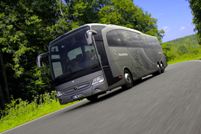
SPAIN The Mercedes-Benz Travego Edition 1 has been voted ‘Coach of the Year 2012’ in Spain. It is the first touring coach claimed to meet the future Euro 6 emissions standard which becomes mandatory in 2014. It features the new range of BlueEfficiency Power engines, a new transmission with new gearshift, an upgraded, ergonomically optimised cockpit, and new safety features.
The engine is a vertical inline six-cylinder OM 471 with a displacement of 12.8 litres and develops 350 kW (476 bhp) at 1800 rpm. Maximum torque is 2,300 Nm at 1,100 rpm. It features a unique common-rail injection system plus X-Pulse injection with pressure booster. This delivers extremely precise fuel injection with cylinder-selective control, high injection pressures of up to 2,100 bar and freely modulated injection – the prerequisites for low fuel consumption, low exhaust emissions and smooth engine operation.
Additional advantages are an effective three-stage exhaust brake and asymmetric turbocharger. Despite EGR, this ensures rapid response to accelerator movements to the benefit of agile driving performance.
Mercedes-Benz says the particularly stringent requirements of the future Euro 6 emissions standard for nitrogen oxide emissions (NOX) generally stand in contradiction to the demands for further reduced particulate emissions and low fuel consumption. The manufacturer resolves these conflicting objectives with X-Pulse injection technology, in conjunction with a complex emission control system. This involves the BlueTec engine technology with SCR and AdBlue injection combined with exhaust gas recirculation and a particulate filter, resulting in a reduction in pollutant emissions without the increase in fuel consumption which was initially feared. At the same time AdBlue consumption is reduced by around 40%.


